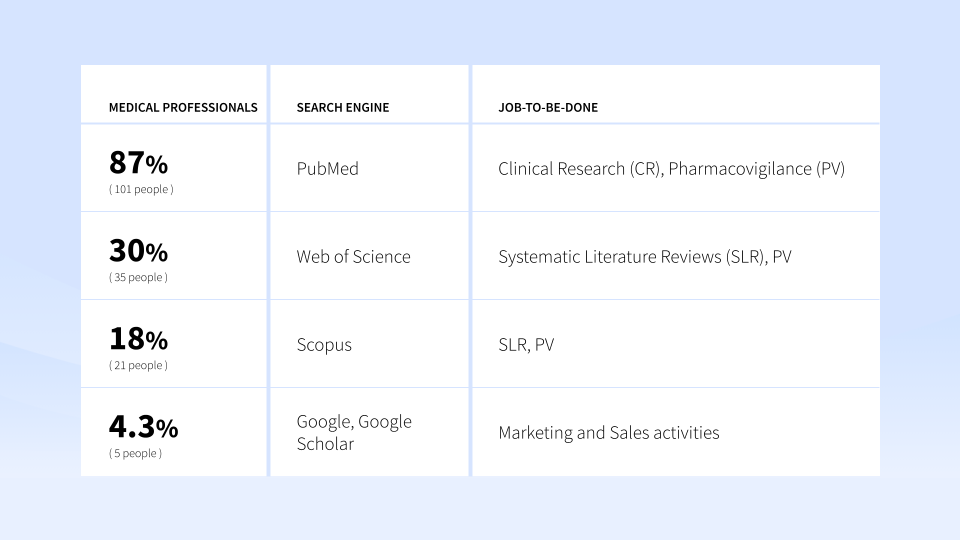Why isn’t Google the most used search engine in Pharmacovigilance and Clinical Evidence?.
We asked 116 medical professionals which search engine they use and for which task. Google was not on the top for medical related activities due to explainability, transparency and privacy.

Google is considered the best search engine out there. It goes beyond simple searching information, and it has reached the point that it replies to questions by interpreting natural language. Though, even with the perfect reply on our hands there is an underlying problem: the explainability, reproducibility and privacy of the response.
Out of interviewing 116 medical professionals, we asked which search engines do they rely upon for their Job-to-Be-Done. The vast majority mentioned PubMed when performing medical related activities, and Google/Google Scholar for marketing activities.
This is easily explained as Marketing and Sales use Google as their primary source of finding publications and clinical evidence, as usually from clients it is not required an explanation of why & how, but mainly only on which sources cite your product.
When performing Medical Research in the form of PV, SLR or CE, instead, you’ll write a report to submit internally to your Head of PV or CSO/CMO, or even to a governmental authority audit. In both cases your input (search strategies) and output (search results) will be scrutinized and evaluated upon the following questions:
- Explainability: can you explain why you are getting these results to a patient?
- Transparency: can you explain how you got the results? Could you replicate the steps if needed?
- Privacy and Bias: does everyone get the same results given the same input?
Input - Search Strategies
The first part is the search strategy generation. How we came up with certain topics and why. Google has a handy “Related queries” that in this context cannot be used: you have to know how they are related, why they are related and is everyone getting the same related queries
In PV, SLR and CE a common pattern is to analyze titles and abstracts for relevant co-occurrences from broad topics and start generating iteratively search strategies. While such an approach will take most of your time, it is easy to explain (why), to reproduce (how) and everyone can come up with the same inputs.
Output - Search Results
The problem with engines such as Google is that you cannot really explain why you are getting that specific result list. “What’s the capital of Sweden?” would give you results mentioning “Stockholm” perhaps without mentioning the word “capital” in the results. While this is a gain in relevancy, it is a loss in explainability.
Even if you would get a strict word match with advanced-search, you’ll get stuck in how you got such results. As the steps behind are not publicly known.
Finally, if you and I insert the same search strategy, we would most definitely get different results: personal preferences, geographical location, gender, age, previous searches, etc.
Search Engines that take a regulatory standpoint at heart, will be able to automatically show you why you are getting such results, how you got to them and in all cases, given the same input, everyone gets the same output.

Check out a PapersHive and book a free trial!

Everything starts with search.
With a smart suite of search tools to help you find the information you need, when you need it. Enhance your Search Experience with PapersHive Today!
Contact Us